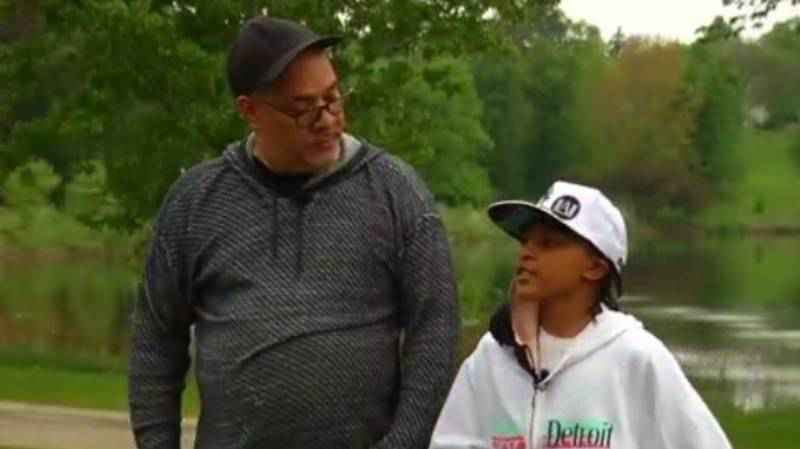‘We’re still all healing’: Those who gathered at George Floyd Square last year reflect on anniversary
[anvplayer video=”5032504″ station=”998122″]
In the days and weeks that followed George Floyd’s death, thousands of people gathered at the intersection of 38th and Chicago to pay their respects. Mourners left flowers, artwork and messages in the square.
Emmett Dysart brought his grandson, Elijah Dysart, to the intersection on May 27, 2020. 5 EYEWITNESS NEWS reconnected with the pair last week.
“I remember how I felt,” he said. “I was angry, I was hurt, I was scared… For me when you see the cops, most of the time you feel like you’re safe. But when things like this happens, you don’t feel as safe.”
Dysart knows south Minneapolis well and grew up at the intersection. He remembers playing video games at the drug store, which predated Cup Foods.
“Right on the corner of 38th and Chicago, I grew up there,” Dysart said.

Emmett and Elijah Dysart
He told KSTP he was shocked when he found out that was the location of Floyd’s death.
“That’s why I was there the next day to see for myself this happened,” he said. “There had been other police brutality things going on in that neighborhood throughout my life, but I never heard of anyone dying from it.”
His 10-year-old grandson said Floyd’s death gave him a new perspective on racism in America.
“In my life, there wasn’t really that much racism,” Elijah Dysart said. “When I heard about George Floyd and stuff, it started hitting on me different.”
He told us he has been motivated to take on the change the world is calling for, hoping other leaders step forward as well.
“If nobody is really willing to take a big step, then I’ve been thinking to myself, maybe I need to take a big step and do it myself. Because if nobody can do it, it’s depending on me,” he said. “I’ll still be waiting on somebody just in case, but if that doesn’t happen, in a little bit longer, I’ll try to do everything I can.”
Over the last year, they’ve attended marches across the country advocating for racial justice and police reform.
“We just talk about being active and staying aware and just doing our part what we can do,” Emmett Dysart said. “We still have the issue of the police brutality, not just here in Minnesota but throughout our country.”
Dysart said they’ve reflected on Floyd’s legacy as well.
“We’re still all healing, and it’s going to take time,” he said. “We’ve had a few more deaths by police in our community since then, and for me, I think that this brought light to the situation. ‘Will the spark stay lit?’ is kind of how I’m looking at things a year later.”
He told KSTP, “Hopefully the spark will stay lit and it will bring a lot of light to the situation of the systematic racism, police brutality. It’s something bigger than all of us.”
Bishop Richard Howell, pastor of Shiloh Temple International Ministries was also at 38th and Chicago in the days after Floyd took his last breath there. He joined Rev. Al Sharpton and other faith leaders in prayer.
“That very moment when time froze, when Rev. Sharpton was there along with many other faith leaders, committed leaders, it was a moment of reality, a moment of introspection and reflection on what just happened,” said Howell.
“I still remember when the microphone was given to me. What do you say? What kind of words of comfort can you say in the midst of death? So the best thing I could say was justice has to be done. And that justice will be served to these men that (are) responsible of taking the life of George Floyd.”
He told KSTP he doesn’t feel there has been enough justice one year later.
“We need police reform throughout this country,” he said. “I’m grateful that the federal [government] stepping in and realized that the human rights and civil rights were taken away, without giving this man a chance to breathe.”
Howell told 5 EYEWITNESS NEWS he hopes the conversation about reform continues with a focus on changing the use of deadly force protocol.
He pointed to Daunte Wright’s death, which happened during the trial of Derek Chauvin, and the shooting of Andrew Brown Jr. in North Carolina the day after a verdict was announced.
“It’s a saga that never ends it seems like,” said Howell. “So where do we go from here? We have to continue to police the police department, continue to seek reform. Not to defund the police but to help the police to become more aware on how they can deal with dangerous situations without necessarily using deadly force.”
He said he felt hopeful seeing thousands of people march and demonstrate in the wake of Floyd’s death.
“This generation that we see today, the young people are definitely demonstrating a flair for community,” said Howell. ”When I saw that different bouquet, flowers of colors, marching, demonstrating for justice, I said ‘Wow, these are different colors here, and doesn’t that give you some kind of idea of what our future could look like?’”
Coming together as a community, he said, will be important to achieve healing.
“That the neighbors become neighbors, that partners become partners, regardless of your political ideology, and your denominational affiliation … It’s not too late to have that hope, it’s not too late to have that dream, it’s not too late to look down a person the only time you do, and lift him up,” Howell said. “It’s not too late to have a good relationship with the police department. We have a great police department. We have a great police chief here, and I do believe that now is the right time to bridge those communities.”